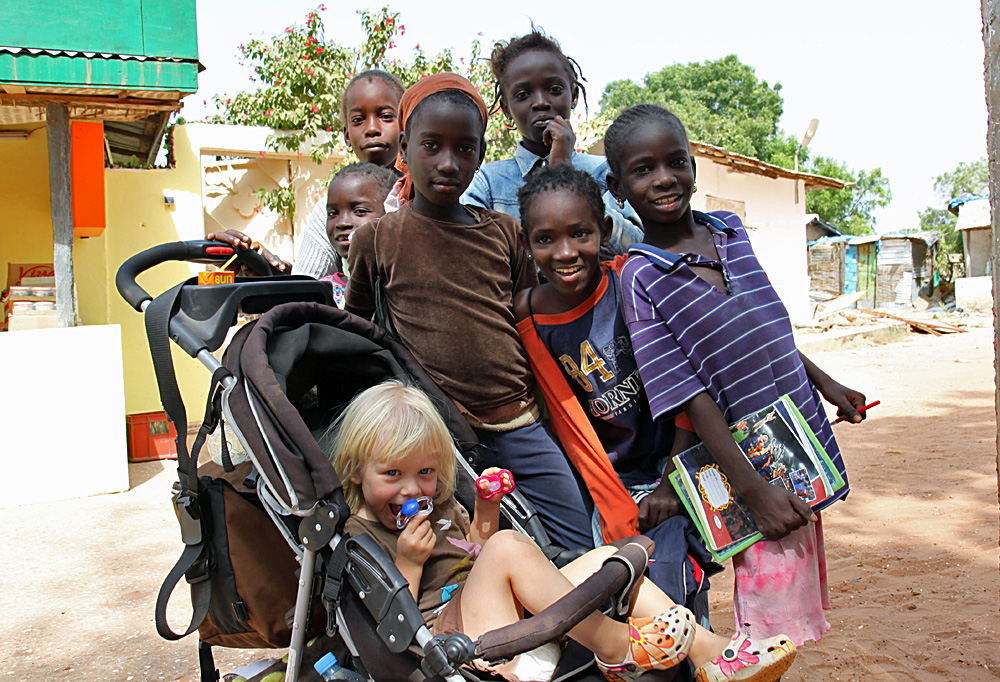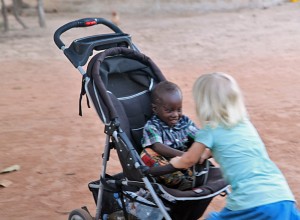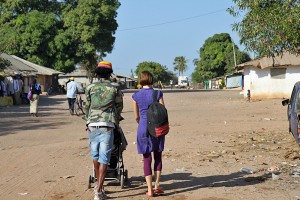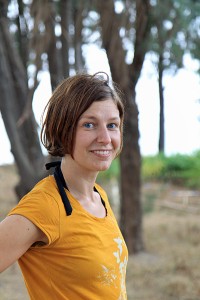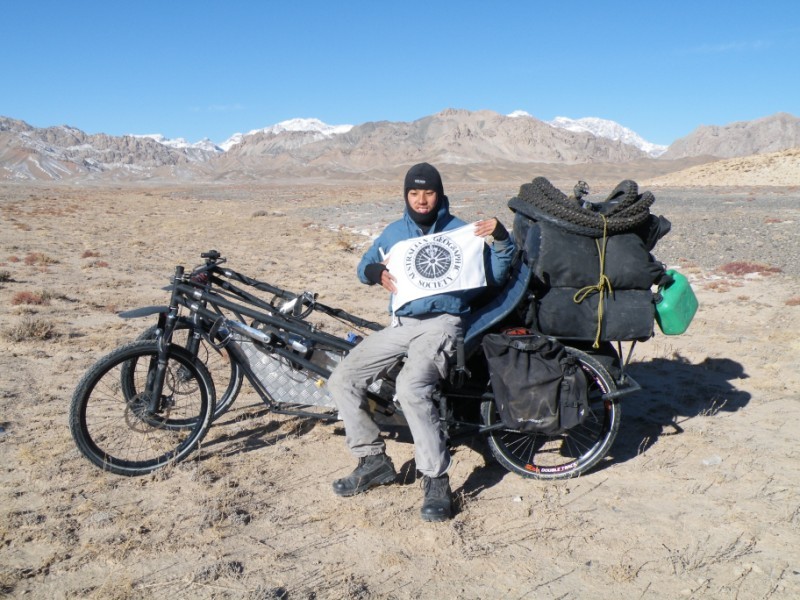“What will you do now, when you have a child, does this end of travelling for you?” is one of the most asked questions I get. And there´s no doubt it has changed my life on every level. For the better. No doubt. And travelling with children, sure, it is a bit more complicated, but shouldn´t have to be too big of a drama. Which David Grant can testify to. Then again, he is after all from the far north of Scotland. So when I met Karolina and heard about her and her family´s story visiting Senegal, it made me very happy. I do live in the extremely security minded Sweden after all…
In Senegal with a stroller
by
Karolina Jeppson
Being familiar to parts of West Africa through work and travels, new perspectives were recently introduced in my relationship with the region. My daughter, 2 years and 9 months, came along on the journey.
In a light green colored room at a tiny Gambian hotel, our daughter had just fallen asleep in a metallic little cot we borrowed from the staff of the hotel. The sounds of the cicadas were as loud as if they were inside the room. All of a sudden, just before turning off the lamp, I realized that we had forgotten something on the airport. The stroller. Should we go back to get it early the next morning? It was a cheap stroller that we had got from relatives. Maybe we should leave it and just continue to the southern parts of Senegal? In the morning, I, my daughter and some other people went by jeep looking for some blond guy, (my husband) somewhere by the motorway outside the airport. There he was finally, with the stroller safely in his hands. It was packed onto the roof, in company with the traveller’s cot stuffed with nappies, the rucksack for babies and our backpacks.
Our main destination for some weeks was a village by the coast in the Casamance region, called Kafountine. We had planned a trip to Senegal mainly for vacation.. There would also be time to do some journalistic work. Kafountine is a lively big village, where fishing is the largest source of income. There are a number of small restaurants, shops, clubs and bars. Music is part of daily life, drums are for sale in the streets and every other night club offers djembe-sessions with incredible dancing to come with it. Music and cultural festivals are frequent in the different villages in the vicinity. There are many famous djembe and cora-players from this part of Senegal, styles of music that we appreciate a lot. Some of them now live in Scandinavia. Whenever I’ve been travelling or working in Africa before, it has been with adults, or youths. This time it was completely different.
“Ca va?” – “Cassomay!” Shouting these phrases in French and the local language karone (which means “how are you”), our daughter made her own friends. She was the first one people talked to when we were out walking in the village. Children came up to play with her and we were chatting with people while the kids were playing around. She could suddenly disappear playing around with the young men that worked where we stayed. She got to know more people than I. However, the first days she wanted to watch TV, drink milk, or pear juice. She didn’t want to eat the food, she wanted pommes frites. We were at a friends “compound” drinking tea with his family. The children were playing, all around us. I never heard any child complain about anything. Our daughter did it all the time. When we had tea she screamed for the special kind of pear juice she is used to have. Our friend’s family looked at her as she was sick.
? What’s wrong with her?, my friend Yorro asked. But this behavior changed rather quickly, which was a great relief.
Walking down the streets in Kafountine with a stroller was a funny experience. The stroller was unique for the village. But the experience was twofold. We brought a rucksack to carry her in for most of the time, especially for sandy roads. Earlier on though, she has disapproved greatly to this idea. This made us bring the stroller to give her some rest when we wanted to walk where it was possible, or just hang out somewhere while she took her daily siesta. Compared to local kids of her age, she seemed like some queen, pushed around with her dummy in her mouth. Some of the other 3-year-olds’, came with their baby sister or brother on their back, swept into a rucksack of cloth. My daughter seemed baby-like, compared to the local kids of her age who gave an impression of independence. Questions about how our different circumstances of growing up affect us, crossed my mind constantly during our journey. My daughter does not, so far, have any siblings and does not so far, have a lot of obligations. These kids knew early what they could do and what they had to do. The stroller became the most hilarious thing to play with. Kids put a tiny four-months year old in the stroller, driving her around like crazy. And they pushed each other around, laughing their heads off. Incidents like this were manifold during our time in Kafountine.
We brought a few books, some crayons and paper to draw on, and some other toys. I blamed myself for not bringing more, both to her and to her new friends. It turned out these things were quite enough, for my daughter at least. She found ways to improvise, to play with what she could find and with whom she could find. This was interesting to watch. It also raised questions. Are children’s fantasies haltered by all the new things, new movies, new books we serve them with? What impact do too many alternatives have on children’s creativity? During the weeks, she made interesting progress. There was the change from being scared to death by ants, to an awakened interest in studying them close-up. There were the dark nights when we found our ways on the sandy roads with a small torch which she found very scary for a start, then these walks turned into exciting moments. Her bed under the mosquito net, she always viewed as a cozy tent. She felt it was fun sitting next to me in the front seat of the car, next to the driver when we made a longer journey – just to keep her under the only safety belt that existed. She learnt how to swallow malaria pills whole, instead of us smashing them to pieces and smuggling them into the filled biscuits that we bought for this purpose only.
The music festivals were various and during the nights we were going out at local clubs or joining people that went to festivals in other villages. We took some nights each, shifting between us, so that one of us could be at home with our daughter. Travelling with a child is fully possible even where climate, food and standards are very different, it turned out. She seemed to acclimatize quickly, socialized with everyone she met, which made her an opener into social gathering for us. During our planning I had set up a huge amount of obstacles for myself. Characteristic to a parent, be it Swedish or not, the questions that arose before the trip concerned security in all aspects. Transportation, diseases, access to health care – all sorts of threats to my daughter’s well-being crossed and took over my mind. This made me feel like my anxious grandmother and blurred my visions for an interesting time in Casamance. It was a process to both overcome and live with these thoughts. For our next trip, I now know that some of all that stuff we brought is definitely not necessary. Children adapt, just like adults. The traveller’s cot we actually never used. The rucksack and the hundred nappies were very usable. The plastic swimming-pool we left with other kids. And the stroller? It might just as well come with us the next time.
Karolina on who she is: 19 I did my first voluntary work for half a year in the Middle East. When I was 21 I stayed for another voluntary period in India. At that age, these periods in other cultures affected me positively and deeply, pushed me in the direction of studying cultural anthropology. I have previously worked with supporting and arranging for young people to commit themselves to voluntary work in social projects and education for example with the Karen minority of Thailand and Burma. I have been on missions to Congo, Mali and Niger and got interested in religion and culture in these regions. My passion for writing in different genres, for cultural and religious issues, pushed me into journalism, as well as currently Islamic studies.

